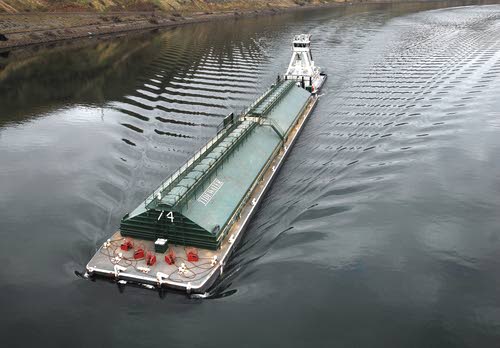forum
library
tutorial
contact

Judge Prohibits Union
from Picketing Barges
by Mateusz Perkowski
Capital Press, October 16, 2013
|
the film forum library tutorial contact |

|
Judge Prohibits Union
by Mateusz Perkowski
|
 The longshoremen's union has been ordered to stop picketing neutral grain barges on the Columbia and Snake rivers. A federal judge found that the union was unlawfully trying to involve the barge company in its dispute with grain handlers.
The longshoremen's union has been ordered to stop picketing neutral grain barges on the Columbia and Snake rivers. A federal judge found that the union was unlawfully trying to involve the barge company in its dispute with grain handlers.
A federal judge has ordered the longshoremen's union to stop picketing grain barges in its labor dispute with grain handlers.
Longshoremen have been in a labor dispute with several Northwest grain handlers for more than a year. Two handlers -- Columbia Grain and United Grain -- have locked out union workers, while longshoremen have picketed their facilities.
This summer, longshoremen on boats also began picketing grain barges moored on the Columbia and Snake rivers that are operated by Tidewater Barge Lines.
The National Labor Relations Board sought an injunction against the pickets, claiming they unlawfully harm Tidewater -- a neutral party with no authority to influence the labor dispute.
Chief District Judge Ann Aiken has agreed with the agency that the longshoremen's actions aimed at Tidewater are unlawful "secondary pickets" intended to embroil an unrelated company in the controversy.
The International Longshore and Warehouse Union's pickets are directed at Tidewater tugboats trying to move loaded barges near Hayden Island in Portland, Ore., and the Port of Wilma in Washington, the judge said in an Oct. 15 ruling. The tugboats are operated by members of another union -- the Inland Boatmen's Union of the Pacific -- who have honored the pickets.
"Further, certain aspects of the Union's picketing likely fall within conduct deemed 'coercive' or 'restraining,'" Aiken said. "Indeed, I find troubling the allegations that several Union picketers allegedly maneuvered their picket boats between Tidewater tugboats and barges when the tugs were attempting to retrieve the barges for transport."
The judge also found that the waterborne pickets were causing irreparable harm to Tidewater and that the public interest favors an injunction against the activity. Aiken has ordered the ILWU to stop the pickets of neutral barges and has directed the U.S. Marshals Service to enforce the prohibition.
During oral arguments in the case on Oct. 10, the judge asked to cease the waterborne pickets as a sign of good faith in broader negotiations with grain exporters.
After an attorney for ILWU said that dropping the pickets would undermine its efforts at the bargaining table and refused to completely stop, Aiken said she would soon decide whether the activity is lawful.
"Just remember, you asked me to rule," she said.
An attorney for the NLRB said the agency was seeking an injunction because the pickets were a serious interruption to commerce.
"It's completely directed at those Tidewater tugboat captains," instead of the grain handlers' facilities, said Susannah Merritt, an NLRB attorney.
About 35 percent of Tidewater's grain fleet has been rendered inaccessible by the pickets, she said. "As a result, Tidewater is unable to serve other customers who have nothing to do with the dispute."
Michael Garone, attorney for Tidewater, said the company's lack of access to the barges may force it to lay off workers.
The court should issue an injunction because the harm to the company's market share and reputation is irreparable, he said.
"We should be able to move grain between any of those neutral locations," said Garone. "Once the business goes, your honor, it may never come back."
Robert Lavitt, attorney for the ILWU, said the picket boats were a legal "economic weapon" in the dispute with grain handlers, even if they affect neutral parties.
Transporting grain along the river in barges is a crucial part of the grain handlers' business, so picketing barges that serve them is an allowable "primary picket" -- not an unlawful "secondary picket" as alleged by NLRB, he said.
"The operation of the elevators themselves rely on the barges being brought to and from" various locations, Lavitt said.
The barges are an extension of the grain handlers' facilities because they contain grain bound for export, he said. "The union has no interest in interfering in Tidewater's other business."
Lavitt suggested that the judge could order the picketers to establish contact with tugboat captains to ensure the barges held grain owned by the handlers, but Aiken seemed dubious of the idea.
"You can't check whether that actually happened," she said.
After the oral arguments officially concluded, Aiken said the recent resumption of negotiations "cries out for people looking at the bigger picture."
Negotiations between the ILWU and grain handlers broke down more than six months ago, but recently the parties returned to the bargaining table and agreed to further meetings this autumn.
Aiken asked ILWU to consider stopping its waterborne pickets as long as the talks continue.
After conferring with the union, Lavitt said that longshoremen would be willing to allow Tidewater to clear out barges that are currently stranded. However, the union would then resume picketing barges that are identified as serving the grain handlers.
NLRB's attorney said the offer wasn't acceptable and urged Aiken to rule whether the pickets were lawful. The ILWU said it would not completely withdraw the pickets.
In a statement, the longshoremen's union said that restricting waterborne pickets violates free speech and characterized the regional NLRB office as the "biggest cheerleader and supporter of foreign companies engaged in the export of American resources and the assault on American workers."
learn more on topics covered in the film
see the video
read the script
learn the songs
discussion forum
